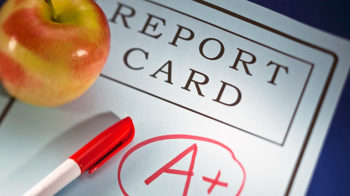
Planning each week for schoolwork and fun, which we covered in two posts last week (one for high schoolers, one for college students), is the first step in having a life that is satisfying and full of academic successes. Learning about how long tasks actually take, what one can realistically complete in a week’s time, and how to fill in the key weekly allotments of work, self-care, quiet time, and fun is a challenging but useful step. Many students will find that their lives become happier and more manageable just by adding a little bit of time-structure to their week. Yet, simply structuring each week to spend time on the key areas of life will not necessarily lead to the desired outcomes that students hold in their heads and hearts.
How do you clarify longer-term goals?
Successful students know that the game of life is played on a daily and weekly basis, but is scored on blocks of 6 weeks, semesters, school years, calendar years, and periods of one’s life. Consistent habits on a daily basis will lead to good outcomes in general, but much of our success and happiness is derived from reaching longer-term goals. Here lies a breaking point that separates the successful students from everyone else. Successful students plan and review each week and additionally clarify their priorities and long-term goals. The only way to reach your long-term goals is to get them out of your head and heart, write them down, make a plan, and execute the specific shorter-term steps that lead to the final outcome. Successful students clarify their goals, integrate the weekly steps needed to accomplish the goals, and hold themselves accountable to the outcome.
Instead of simply completing the required tasks and obligations of their lives, successful students are always thinking many steps ahead. They ask themselves: “What do I want this 6 weeks, this semester, this school year?” When a successful student answers these questions, he or she doesn’t leave the goals in the ether of head and heart space, but instead writes them down and keeps track of them. Goals that are written down are much more likely to be achieved than those that exist only in one’s internal dialogue. By writing down goals, you can then figure out the specific steps needed to reach the destination.
Simple, but powerful questions lead to important insights
Let’s take a simple example. Michelle is a 9th grade student at St. Agnes School. She is a solid student, but wants to reach a new level of achievement by acquiring all A’s in core academic classes during the fall semester. If Michelle were to write the goal down on the first day of the new school year, she could then get to work on figuring out exactly how to make the goal become reality. First, Michelle would ask herself, what do I need to do each 6 week grading period in order to score a 90 or above? She could then ask, on average, how many hours per week do I need to spend on each class in order to master the material? Which classes look to be most challenging? For which class(es) might I need a tutor or extra assistance from my teacher? What habits and routines have helped me to achieve strong grades in previous school years? Is there any subject or habit that has been a trouble spot in the past? Is there a habit that I need to change in order to achieve my goal of acquiring straight A’s in core academic classes?
These kinds of simple, but powerful questions help Michelle get the clarity she needs in terms of figuring out how to reach her desired goal. Once clarified, Michelle can then integrate the answers into her weekly planning. For example, Michelle knows that she struggled to reach a grade of 85 in her Algebra I class in 8th grade, so she will  likely have similar difficulties in 9th grade’s Algebra II course. Anticipating such difficulties, Michelle is honest with herself and her family and then goes to Mom in order to setup a weekly hour-long tutoring session for Algebra II.
likely have similar difficulties in 9th grade’s Algebra II course. Anticipating such difficulties, Michelle is honest with herself and her family and then goes to Mom in order to setup a weekly hour-long tutoring session for Algebra II.
Michelle is gifted in verbal abilities and has always achieved high marks in English courses. While 9th grade will surely bring more challenging works and a faster pace, Michelle knows that completing all reading assignments and taking good notes will very likely lead to a grade of 90 or above in English.
World History is an unknown for Michelle, so she makes sure to look closely at the weekly syllabus and required tests and papers to make an educated guess as to how much time to spend on the course each week. Seeing that there are 3 five-page papers during the course of the fall semester, Michelle writes the deadlines for each on the whiteboard that hangs on her bedroom wall. She knows that she must work backwards from the paper due dates in order to craft a plan to create papers that receive A grades. When she is three weeks from each paper’s due date, she will hash out a step by step plan of action to complete the paper.
Biology is Michelle’s least favorite class. It’s a course that is filled with tests that cover technical terms and definitions and requires a lab report every other week. Michelle knows that she will have trouble with a commitment to spend the time needed on Biology to acquire an A for the semester. She brainstorms for solutions to this difficulty. She asks herself, “what can I do to make sure that I spend the time necessary to master Biology?” A lightbulb flicks on and Michelle has an “aha moment.”
What do I need to do in order to easily reach my goal?
Michelle’s best friend, Anna, wants to be a doctor and Anna is an ace science student. Michelle thinks, “if I spend 2 hours per week studying with Anna, I am sure to complete all of my Biology lab assignments and get all the help I need in understanding the technical vocabulary. So, each week, I will plan a 2 hour study session with Anna.” This a simple and achievable result, but one that only happens if Michelle holds herself to the goal of getting an A in Biology and makes plans that are honest and realistic.
Michelle is very clear about her motivation levels and she knows that if she doesn’t have something to look forward to each week, she loses her drive. In order to get A grades for the fall semester in English, World History, Algebra II, and Biology, she’s going to need a good outlet for fun each week that is not just the normal hanging out with friends. Michelle has always wanted to become a fashion designer and she is not a great sketch artist, even though she loves drawing. Michelle is certain that a weekly drawing class at Glassel School of Art would be something that will bring her a big dose of joy, so she asks Mom to help her register and arrange transportation.
The cycle of productivity must have a place for review, acknowledgment, and rewards
A final step in reaching her goal of acquiring A grades in all core subject areas is planning for a celebration upon achieving the desired outcome. Michelle pulls her Dad aside to talk about her plans. Dad is of course thrilled that Michelle wants to be a straight A student and he agrees that if Michelle reaches such a lofty goal that she deserves a reward. So, Dad agrees to Michelle’s request for a weekend getaway to New York City during the Winter Holidays as a carrot to spur on Michelle’s motivation during the semester. But, Michelle and Dad will only make the trip if Michelle gets the A grades she set out to achieve.
Michelle is thorough, but not obsessive in her planning. She thinks long-term about important goals and lays forth the steps required to achieve such outcomes. While the whole process of self-inquiry, planning, and arranging takes some time, Michelle understands that a few hours of preparation are all that is needed to achieve spectacular results. She’s honest with herself and her family and obtains the needed assistance to arrive at her destination. Most important, Michelle writes down her goal of straight A grades and also keeps track of the steps needed to reach such a goal. Each week, Michelle will incorporate the needed steps in her calendar. She is going to hold herself to the goal and the plan so that she can reap the rewards of achieving strong grades and finally visiting the fashion capital of New York City.

Planning and accountability can be easily learned
Planning and holding one’s self to desired goals in school and life is not overly difficult. There is some effort and organization required, but such a process is not overly time-consuming. Work spent in planning and holding yourself accountable will be offset by the efficiency gained when doing so. There is hardly a student on the planet Earth who cannot learn to: clarify life and school goals, plan and review, and hold him or herself accountable to reaching the desired results. Any high school or college student can make their life more satisfying and fun by thinking in longer chunks of time and writing down the goals he or she wishes to achieve. This is not rocket science, but does require different habits and a restructuring of efforts and energy.
If you or your child is not efficient with time-management, planning, and reviewing, then you need our help. We can teach any student in America to plan and review each week, clarify long term goals and desires, and help him or her hold their feet to the fire of accountability. Take a look at our Teen Independence Program for high school students and the College Life-Management Program for more information about our time-management and mental performance skill coaching.
